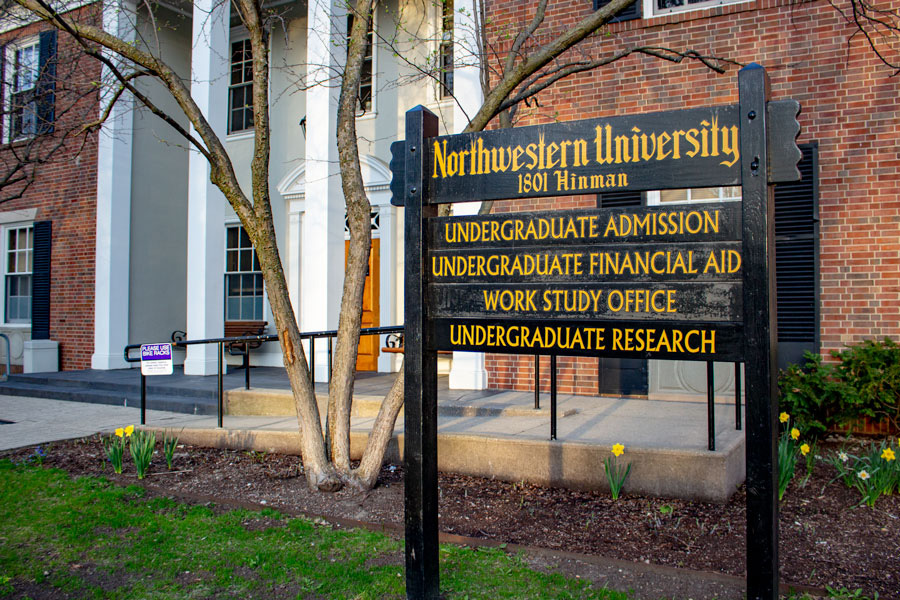First-generation, low-income students feel priced out of study abroad
Daily file photo by Evan Robinson-Johnson
The Office of Undergraduate Financial Aid, 1801 Hinman Ave.
February 6, 2020
For first-generation, low-income student Anor Chen, the first week back on campus after winter break was full of stress.
“It was basically me just running around campus getting signatures — but also me spending a lot of time worrying,” Chen said.
Chen, a Weinberg sophomore, was referring to the study abroad application, which he looked into after fall quarter. He began the application during winter break, but discovered after arriving back on campus that it required much more work on his end than he thought.
When Chen spoke with the Office of Undergraduate Financial Aid during appointments regarding his finances for his study abroad experience, he said he often left confused and worried that he couldn’t afford the experience.
“If you want to get through it, you better hope you have time to sit down, talk to everyone and spend a week dedicating yourself to this,” Chen said.
Chen said he had five to 10 email exchanges with the financial aid office in total. Throughout these conversations, he realized the office misunderstood his financial situation and scholarship status.
In initial conversations, the financial aid office advised Chen to apply for a variety of scholarships. Because Chen is already a recipient of outside scholarships, he thought this advice meant the office was already aware of his preexisting aid — and that these scholarships would not fully cover his study abroad experience.
“There was a lot of information that was just going over my head,” Chen said. “At one point, I felt like I had to pay the (Expected Family Contribution) myself.”
Chen talked about studying abroad with some of his peers, hoping to get advice, but due to their drastically different financial situations, he found it impossible to relate to some of his classmates’ experiences applying to programs.
Some of the people he talked to told him they were unaware of any information about study abroad finances because their families were able to pay it for them.
“The conversation stops there,” Chen said of those exchanges. “The money isn’t even an issue for them. That’s not feasible for someone like me.”
Krista Bethel, senior assistant director of Undergraduate Financial Aid and the manager of Study Abroad Financial Services, said the office’s main goal is to make study abroad possible and accessible for FGLI students.
Bethel said many students who get regular refunds through financial aid get larger refunds when studying abroad.
“I would say that study abroad is definitely doable,” Bethel said. “Most students find it to be as affordable or more affordable than staying at Northwestern.”
However, that narrative doesn’t match the reality for many students. Serena Salgado, a Weinberg senior, said her experience studying abroad in South Africa in Spring 2019 came with significant stress prior to her departure.
When it came time to book a flight, Salgado struggled to find affordable options. The University has a program called Bridge Builder, designed to help with the immediate costs of studying abroad, including airfare and passport fees. The program offers to pay for flights and other up-front costs for affiliated programs that need to be paid before financial aid packages kick in at the beginning of the study abroad period.
However, Salgado said the NU-recommended flight most of her peers took was not the cheapest flight available. She found a cheaper flight, but coordinating that transportation with the travel agency proved difficult.
“I would find a cheap flight and it would take (the travel agency) a couple days to respond to me, and by then, the price of the flight would’ve gone up,” Salgado said.
Salgado also said being on a different flight meant she arrived in South Africa much earlier than most of her peers, causing her to have to coordinate her own transportation to her housing unit. Because of this, she couldn’t meet the other participants of the program until the next day, after they had all met each other at the airport the day before.
While Salgado enjoyed her study abroad experience, she emphasized the stress leading up to her departure. She said the office could improve in several ways to make FGLI students feel more comfortable before leaving for a trip.
“If it had been explained to me that food was cheaper in South Africa than it is here, I might’ve felt better,” Salgado said. “If they had referred me to a student who had gone before that had been in a similar financial situation as me, that also would’ve helped. I feel like the financial aid office doesn’t have a firm grasp on what to expect when you’re there.”
During a presentation for a student organization with which Salgado is involved, Salgado said a staff member from the financial aid office referred to low-income students as “high-needs” students.
“That’s uncomfortable,” Salgado said. “Sometimes it feels like literally the person who’s working there doesn’t understand the experience of low-income students and is dismissive of them. That was one of the most frustrating parts.”
Email: andreabian2022@u.northwestern.edu
Twitter: @andreabian_
Related Stories:
– Emergency Aid Fund moves from SES to the financial aid office
– Compass peer mentor program gives low-income students a helping hand



